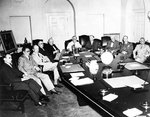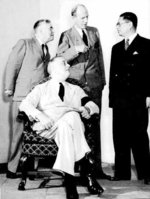First Washington Conference
Contributor: C. Peter Chen
ww2dbaseThe Arcadia Conference took place in Washington, United States, in which meeting Winston Churchill and Franklin Roosevelt concluded that despite the recent Japanese aggression toward US and UK holdings in teh Pacific, Europe remained the top priority of the Allies. The two leaders agreed that the military resources of the United States and Britain (with its Commonwealth forces) must be combined under one command in order to most efficiently fight the war against Germany. In addition, the United Nations was formally established during this conference on 1 Jan 1942.
ww2dbaseSource: Wikipedia.
Last Major Update: Sep 2005
First Washington Conference Mapa Interativo
Photographs
 |  |
First Washington Conference Timeline
| 30 nov 1941 | Winston Churchill sent Franklin Roosevelt a message requesting a conference on the impending war with Japan. Roosevelt would reject the request to avoid appearing like he was taking the United States toward war for the defense of the British Empire. |
| 9 dez 1941 | Winston Churchill sent Franklin Roosevelt a message requesting a conference on the war with Japan. Roosevelt initially intended to reject this request, wishing to give his top generals more time to research the situation to avoid the British dominating the conference. |
| 10 dez 1941 | Franklin Roosevelt tore up a letter he drafted for Winston Churchill intending to delay Churchill's request for a conference as he heard news of the Japanese sinking of HMS Prince of Wales and HMS Repulse off Malaya and realized the urgency of having to plan for a campaign against the Japanese. |
| 12 dez 1941 | Prime Minister Winston Churchill boarded HMS Duke of York for the first joint wartime conference (codenamed ARCADIA) of military personnel. |
| 13 dez 1941 | British battleship HMS Duke Of York departed the Clyde, Scotland, United Kingdom with Winston Churchill on board, sailing for the United States. The battleship was escorted by destroyers HMS Faulknor, HMS Foresight, and HMS Matabele. |
| 22 dez 1941 | A Primeira Conferência de Washington (Arcadia) entre Roosevelt e Churchill começou a bordo do HMS Duke of York na Baía de Chesapeake, Maryland, Estados Unidos. Americanos e britânicos planejaram um Estado-Maior Combinado representado por ambos os países. |
| 23 dez 1941 | Winston Churchill e Franklin Roosevelt se encontraram na Casa Branca, Washington DC, durante a Primeira Conferência de Washington (Arcadia). |
| 31 dez 1941 | At the Arcadia Conference in Washington DC, United States, Winston Churchill and Franklin Roosevelt agreed on a "Germany First" strategy. |
| 1 jan 1942 | British Prime Minister Winston Churchill, US President Franklin Roosevelt, Soviet Ambassador Maxim Litvinov, and Chinese Ambassador Song Ziwen (also known as T. V. Soong) signed the Declaration by United Nations during the Arcadia Conference in Washington DC, United States. |
Você gostou deste artigo ou achou este artigo útil? Se sim, considere nos apoiar no Patreon. Qualquer valor já vai ajudar! Obrigado. Por favor, ajude-nos a divulgar o site: Fique atualizado com WW2DB: |
Visitor Submitted Comments
All visitor submitted comments are opinions of those making the submissions and do not reflect views of WW2DB.

» Churchill, Winston
» King, Ernest
» King, Mackenzie
» Dudley Pound
» Roosevelt, Franklin
» Song, Ziwen
» Halifax
Location:
» United States
- » 1,182 biografias
- » 337 eventos
- » 45,119 entradas na linha do tempo
- » 1,249 navios
- » 350 modelos de aeronaves
- » 207 modelos de veículos
- » 376 modelos de armas
- » 123 documentos históricos
- » 261 instalações
- » 470 resenhas de livros
- » 28,415 fotos
- » 365 mapas
Winston Churchill
Por favor, considere nos apoiar no Patreon. Mesmo R$1 por mês já faz uma grande diferença. Obrigado!
Ou, por favor, nos apoie adquirindo alguns produtos do WW2DB na TeeSpring. Obrigado!
1 Jun 2017 05:29:23 AM
It is interesting to see how this, and other web pages, glorify this conference for its unanimous agreement and unity when it is known that it was a lot of disagreements between the participants and while the "Germany-first" strategy was adopted in principle it was hardly so in practice. This is shown in the cuts in the already promised troops movements to the UK and even more after the conference. The North African invasion was, during the conference, delayed from May 1942 to November and of three more promised divisions to Europe only one eventually went. The others were sent to the Pacific. In every corner the US negotiators insisted that ship transport should be subject to Pacific needs.
Fred